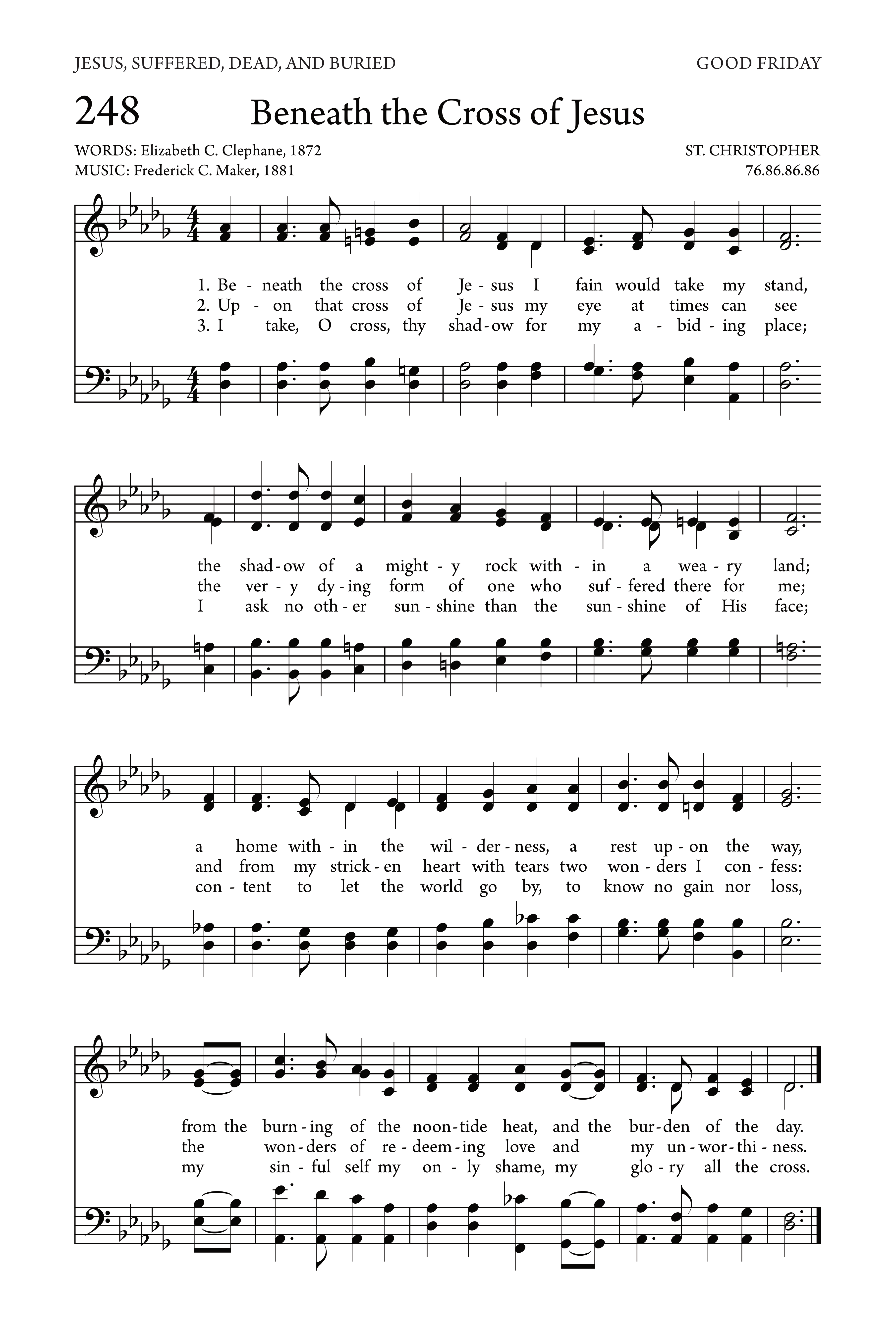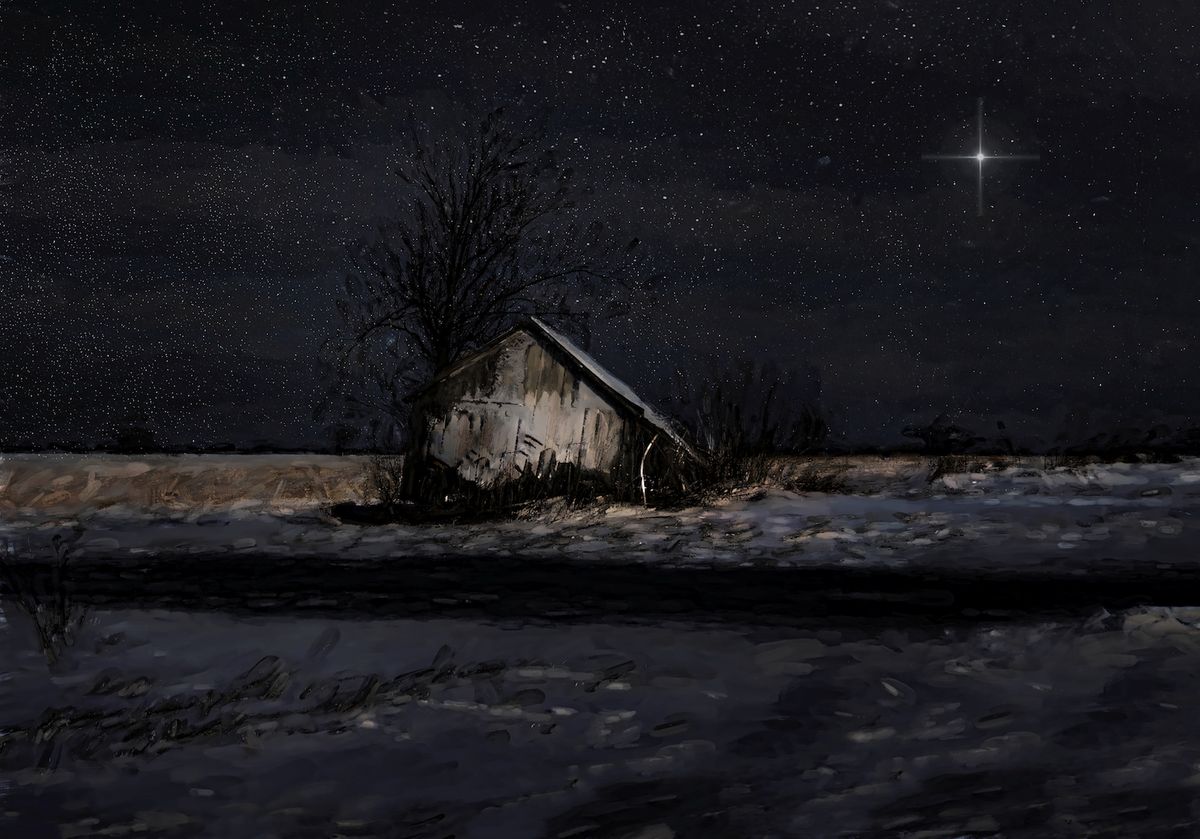Beneath the Cross of Jesus
By Elizabeth Cecilia Clephane
Lyrics
I fain would take my stand;
The shadow of a mighty rock
Within a weary land;
A home within the wilderness,
A rest upon the way,
From burns beneath the noontide heat
And burdens of the day.
Mine eyes at times can see
The very dying form of One
Who suffer'd there for me;
And from my striken heart, with tears,
Two wonders I confess:
The wonders of redeeming love,
And my unworthiness.
O refuge tried and sweet!
O sacred place where Heaven's love
And Heaven's justice meet!
As to the exil'd patriarch
That wondrous dream was given,
So seems my Savior's cross to me:
A ladder up to Heav'n.
For my abiding place;
I ask no other sunshine than
The sunshine of his face;
Content to let the world go by,
To know no gain or loss;
My sinful self my only shame,
My glory all the cross.
Bible Reference
I Corinthians 1:18
About This Hymn
“Beneath the Cross of Jesus” — A Testament of Faith from a Quiet Soul
For the preaching of the cross is to them that perish foolishness; but unto us which are saved it is the power of God. — 1 Corinthians 1:18 (KJV)
This treasured hymn was penned by Elizabeth Cecilia Douglas Clephane, a delicate and devout Scottish Presbyterian woman of the 19th century whose physical frailty was far outweighed by her spiritual strength and compassionate heart. Despite struggling with fragile health throughout her life, Elizabeth was known throughout her hometown for her generous and cheerful disposition. Born in Edinburgh, Scotland, she spent most of her life in Melrose, near the tranquil landscapes of Abbotsford, a region immortalized by Sir Walter Scott in The Abbot and The Monastery. Her father, a sheriff of the county, and her mother, a descendant of the noble Douglas family, raised Elizabeth and her two sisters in a home rooted in duty, humility, and devotion.
Though quiet and unassuming, Elizabeth dedicated her limited physical energy to ministering to the sick and poor in her community. The Clephane sisters were known for their sacrificial charity, giving generously of what little they possessed beyond their daily necessities. Elizabeth’s bright and hopeful nature earned her the affectionate nickname “the Sunbeam” from those in her community. Her poetic talents were expressed in various religious publications, most notably in The Family Treasury, a Scottish Presbyterian magazine. Many of her poems appeared anonymously, especially after her untimely death at age 39 in 1869. Three years later, a number of her poems, including “Beneath the Cross of Jesus,” were published posthumously in that same magazine.
Elizabeth composed “Beneath the Cross of Jesus” in 1868, just a year before her death. Originally consisting of five stanzas, modern hymnals usually preserve only three. The text reflects deep theological insight and familiarity with Scripture, particularly in its vivid allusions to biblical imagery. Stanza one alone draws from numerous passages: “the mighty Rock” from Isaiah 32:2, “the weary land” from Psalm 63:1, “a home within the wilderness” from Jeremiah 9:2, “rest upon the way” from Isaiah 28:12, “noontide heat” from Isaiah 4:6, and “burden of the day” from Matthew 11:30. Her words reflect not only poetic beauty but also a profound trust in the sustaining power of Christ’s sacrifice. “Beneath the Cross of Jesus” quickly became one of the most beloved meditative hymns in the English-speaking world. Another of Elizabeth’s well-known hymns is “The Ninety and Nine,” which recounts the parable of the lost sheep and is cherished for its narrative simplicity and spiritual depth.
The tune most associated with this hymn, “St. Christopher,” was composed by Frederick Charles Maker, a distinguished English organist and hymn tune writer. Born in Bristol, England, Maker devoted his life to service in the non-conformist churches of his hometown. He was a prolific contributor to The Bristol Tune Book (1881), a hymnal used widely in non-Anglican churches across Britain. “St. Christopher,” with its solemn and reverent melody, was composed specifically for Clephane’s text and beautifully complements its tone of heartfelt devotion. The name “St. Christopher,” meaning “Christ-bearer,” adds symbolic weight to the hymn, aligning with the text’s theme of finding rest and shelter in the shadow of the Cross. Maker is also known for composing the tune to “Dear Lord and Father of Mankind,” another cherished hymn of reflection.
To place “Beneath the Cross of Jesus” in context is to see the enduring power of the cross through the eyes of someone who found in Christ not just a theological concept but a living sanctuary. Clephane’s hymn is not triumphant in tone, like a battle anthem, nor is it merely contemplative—it is devotional. It is the testimony of one who looked upon the cross and found in it refuge, peace, and the promise of eternal rest. In this same spirit, James Montgomery’s stirring 1822 hymn “Go to Dark Gethsemane” echoes similar devotion in its call to witness Christ’s suffering and follow in His path:
“Go to dark Gethsemane, ye that feel the tempter’s power;
Your Redeemer’s conflict see, watch with Him one bitter hour…”
Both hymns speak across time and denominational lines, calling believers not just to look at the cross, but to stand beneath it—humbled, grateful, and transformed.
In Elizabeth Clephane’s quiet yet profound hymn, generations of believers have found words for their own need of grace, their longing for spiritual rest, and their deep assurance in the sacrificial love of Jesus. Through her pen, the “Sunbeam” of Melrose still shines.


📬 Subscribe to Our Devotional Updates
Receive weekly hymns, devotionals, and website features directly in your inbox.
Hymn Information

- Category: Hymn
- Author/Writer: Elizabeth Cecilia Clephane (1868)
- Added: June 5, 2025
- Last Updated: June 5, 2025
- Views: 1012
MIDI File
More Hymns by Elizabeth Cecilia Clephane
Recent Blog Posts
-
 How to Develop a Consistent Prayer Schedule
How to Develop a Consistent Prayer Schedule
Dec 11, 2025 -
 How to Forgive Someone Who Deeply Hurt You
How to Forgive Someone Who Deeply Hurt You
Dec 11, 2025 -

-
 Why Christmas Is Celebrated on December 25
Why Christmas Is Celebrated on December 25
Dec 11, 2025 -
 10 Most Renowned Hymn Writers
10 Most Renowned Hymn Writers
Dec 10, 2025
Visit Us on Social Media
Latest from X (Twitter)
Tweets by HymnalLibraryLatest from Facebook
Latest on YouTube
Daily Bible Verse
Disclaimer
The hymns, sheet music, MIDI files, and related content on this website are provided for educational and research purposes only.
- Public Domain: Many of the hymns featured here are in the public domain and may be freely used.
- Copyrighted Works: Some hymns may still be under copyright protection. Where applicable, permission has either been requested from the copyright owner, or the content is shared under the principles of fair use for educational purposes.
⚠️ Important Notice: If you wish to reproduce, distribute, or use any copyrighted hymn beyond personal study or educational use, you must obtain permission directly from the copyright holder. This website does not grant any rights for commercial use yet.
If there is any other question please address it to us in our Contact Page, for further assistance. Thank you for using the site. May God Bless You.